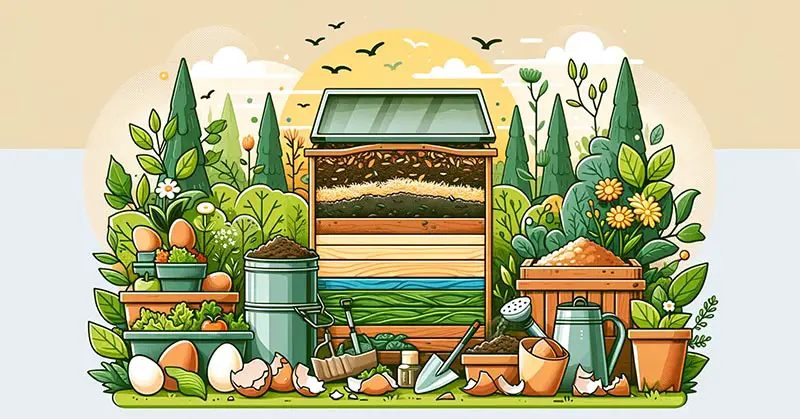How to Compost Garden Waste
Composting garden waste is a simple and environmentally friendly process. It involves collecting organic garden debris like leaves, grass clippings, and plant trimmings and allowing them to decompose in a designated area or compost bin. This natural process transforms garden waste into nutrient-rich compost, perfect for enriching garden soil.
But how exactly do you turn a pile of leaves and lawn trimmings into black gold for your garden? If you’re imagining a complicated or time-consuming process, prepare to be pleasantly surprised. Composting is not only straightforward, but it’s also a fulfilling way to contribute to a healthier environment right in your own backyard.
In this article, we’ll guide you through the steps to create your very own compost heap, address common challenges, and unveil how to use your compost effectively in your garden.

Introduction to Composting
Transforming your garden refuse into valuable compost is a simple yet impactful way to enrich your garden’s soil. Let’s break down the basics of turning garden waste into compost.
Understanding the Composting Basics:
-
What is Composting?
A natural process where organic waste decomposes into nutrient-rich soil. -
Benefits:
Enhances soil quality, reduces waste, and helps in sustainable gardening.
Starting Your Compost Pile:
- Select a Spot: Choose a dry, shaded area near a water source.
- Gather Materials: Combine green waste (like food scraps) with brown waste (like dry leaves).
Selecting the Right Compost Bin for Your Garden
Your choice of compost bin can significantly influence the effectiveness of your composting efforts.
Types of Bins:
- Open Bins: Ideal for large quantities of garden waste.
- Closed Bins: Better for controlling odor and deterring pests.
Placement and Management:
- Location: Place your bin where it’s convenient to add materials and retrieve compost.
- Aeration: Ensure proper air circulation for efficient decomposition.
The Science Behind Composting Garden Waste
To compost garden waste effectively, understanding the underlying science is key.
The Decomposition Process:
- Microorganisms at Work: Bacteria, fungi, and insects break down the waste.
- Heat: A healthy compost pile generates heat, accelerating the process.
Balancing Your Compost:
- Green vs. Brown: Maintain a balance between nitrogen-rich greens and carbon-rich browns.
- Moisture and Air: Keep your compost moist and turn it regularly to introduce air.
Layering Your Compost
Creating the perfect compost pile is akin to crafting a layered masterpiece. Here’s how you can integrate eggshells into these layers:
Basic Layering Technique:
- Bottom Layer: Start with coarse, dry brown material like twigs or straw to allow airflow.
- Green Layer: Add your kitchen scraps (excluding whole eggs) and fresh garden waste.
- Eggshell Layer: Sprinkle crushed eggshells over the green layer. They’ll add calcium and promote a healthy compost mix.
- Brown Layer: Follow up with dry leaves or shredded paper to balance moisture and nitrogen levels.
- Repeat: Continue layering in this order until your bin is full.
Tips for Efficient Layering:
- Crush Eggshells Finely: This ensures they decompose at a similar rate to other compost materials.
- Moisture Control: Keep the pile moist but not too wet, to aid in the breakdown process.
Maintaining Your Compost Pile: Tips and Tricks
A well-maintained compost pile is key to transforming your eggshells and garden waste into nutrient-rich compost.
Regular Care for Optimal Decomposition:
- Turn Regularly: Mix your pile every few weeks to aerate and speed up decomposition. This is especially important when composting eggshells, as it helps integrate them into the compost more effectively.
- Check Moisture Levels: Your pile should be moist like a wrung-out sponge. If it’s too dry, add water; if it’s too wet, add more brown materials.
- Monitor Temperature: A warm pile indicates active decomposition. If it cools, turning it or adjusting the green and brown material ratio can help.
Troubleshooting Common Composting Issues
Even with the best practices, you might encounter some hiccups, especially when learning how to compost eggshells efficiently.
Common Problems and Solutions:
- Bad Odors: This can occur if the pile is too wet or lacks sufficient brown material. Adjust by adding more browns like dry leaves or straw.
- Pests: Attracting pests is a concern when composting kitchen scraps. Ensure your compost bin is well-sealed and avoid adding meat or dairy products.
- Slow Decomposition: If eggshells or other materials aren’t breaking down, increase aeration by turning the pile more frequently and check for proper moisture levels.
Utilizing Finished Compost in Your Garden
Once your compost, enriched with eggshells, is ready, it’s time to put this black gold to use.
Identifying Ready-to-Use Compost:
- Appearance: Your compost should be dark, crumbly, and have an earthy smell.
- Eggshell Breakdown: Most of the eggshells should be decomposed. Some larger pieces might remain, which is normal.
Applying Compost in the Garden:
- As a Soil Amendment: Mix your compost into the garden soil. The calcium from eggshells is especially beneficial for plants prone to blossom end rot.
- As a Mulch: Spread the compost around the base of plants to retain moisture and suppress weeds.
- In Potting Mixes: Use your compost as a component in potting mixes for container gardening.
Reducing Garden Waste Through Composting
Incorporating eggshells into your compost is just one way to reduce waste and promote sustainability.
Benefits of Composting Eggshells and Garden Waste:
- Waste Reduction: Decreases the amount of waste sent to landfills.
- Soil Health: Improves soil structure and nutrient content.
- Water Conservation: Compost helps soil retain moisture, reducing the need for frequent watering.
Composting Through the Seasons: Year-Round Tips
Adapt your composting practices to accommodate seasonal changes, ensuring a continuous supply of quality compost.
Seasonal Adjustments:
- Spring and Summer: Increase green materials like grass clippings. Watch for overheating.
- Fall and Winter: Add more browns, such as fallen leaves. Protect your compost pile from excessive rain or snow.
Advanced Composting Techniques for Enthusiasts
For those looking to elevate their composting game, here are some advanced methods.
Vermicomposting:
- Using Worms: Red wigglers can be added to compost bins to break down organic matter more efficiently.
- Eggshells as Grit: Finely crushed eggshells provide necessary grit for the worms’ digestion.
Bokashi Composting:
- Fermentation Process: This method uses a special Bokashi bran to ferment kitchen waste, including eggshells, before adding it to your compost pile.
Compost Teas:
- Nutrient-Rich Liquid Fertilizer: Steep compost in water to create a liquid fertilizer, excellent for providing nutrients to plants.
FAQs on How to Compost Garden Waste
Q: Can I compost diseased plants or weeds?
A: It’s generally not recommended to compost diseased plants or invasive weeds. Diseases and weed seeds might survive the composting process and spread when the compost is used.
Q: How do I compost large branches or woody materials?
A: Large branches should be shredded or chipped into smaller pieces before adding to the compost pile. This ensures they break down at a similar rate as other materials.
Q: Can I add citrus peels or onions to my compost?
A: Yes, you can add citrus peels and onions, but in moderation. Large amounts can affect the compost’s pH balance and potentially deter beneficial microorganisms.
Q: Is it okay to compost paper and cardboard?
A: Yes, paper and cardboard can be composted. They are considered brown materials. Ensure they are not coated with plastic or heavy inks.
Q: How can I speed up the composting process?
A: To accelerate decomposition, turn the compost frequently to aerate it, maintain a balance between green and brown materials, and keep the pile moist but not waterlogged.
Q: What is the ideal size for a compost pile or bin?
A: A compost pile should be at least 3 feet wide and 3 feet high. This size is ideal for retaining heat and moisture, essential for effective composting.
Q: Can I compost egg cartons or coffee filters?
A: Yes, egg cartons and coffee filters can be composted. They are considered brown materials and help add carbon to your compost pile.
Q: How do I control flies and pests around my compost pile?
A: To control flies and pests, cover fresh green materials with brown materials, keep the pile moist, and turn it regularly. Also, avoid composting meat, dairy, and oily foods.
Q: Can I compost bread, pasta, or rice?
A: It’s best to avoid composting bread, pasta, and rice as they can attract pests and rodents. If you do add them, bury them deep within the compost pile.
Q: Is there a way to compost in an apartment or small space?
A: Yes, you can use a small, enclosed compost bin or try vermicomposting with a worm bin. These methods are suitable for indoor or small-space composting.



